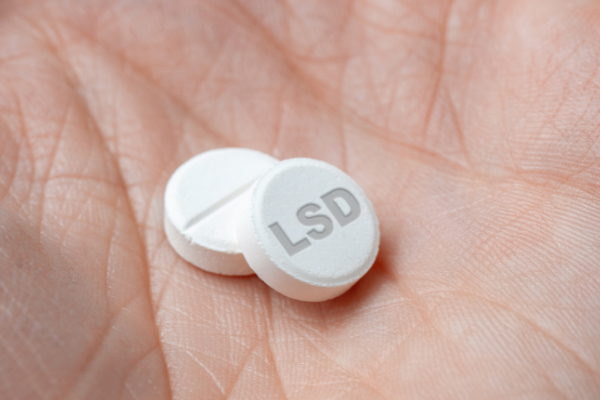LSD stands for Lysergic acid diethylamide. It is a chemical found in the ergot fungus that grows on rye and other grains. Most of it is produced in crystal form in illegal laboratories in the United States. Once created, it is usually converted into a liquid to be distributed. Liquid LSD is most often added to absorbent paper, cut into small squares called windowpane, cubes, or hits. It can also be sold in liquid form. It is odorless, colorless, and users report that it has a slightly bitter taste. Medically, LSD is typed as hallucinogenic. LSD goes by many names, but the most common is Acid, microdots, or simply LSD.
LSD is a Schedule I substance under the Controlled Substances Act; which also includes heroin and MDMA; LSD has a high potential for abuse and serves no legitimate medical purpose. (DOJ)
Can LSD Make a Person Psychotic?
Most people who use LSD do not end up in the psych ward, but it does happen. LSD often causes intense hallucinations that can linger in the persons’ mind for many days and even months. If the person uses LSD often, they may also believe that their combined LSD experiences are real. LSD is similar to stimulants in that it will invoke paranoia and fear because of visual and auditory hallucinations. LSD alone cannot cause a person to go crazy, but it can influence mental health issues if it is abused. Most often, people who abuse LSD will require professional help for their addiction to LSD. Just because LSD is a hallucinogenic drug does not mean it is addictive as cocaine or heroin.
Why Are Hallucinogens Dangerous?
The number of LSD overdoses is higher than that of other hallucinogens. But still, any type of hallucinogen can cause death. Because hallucinogens distort reality, the person will experience fear and anxiety, causing mental discomfort. Additionally, the effects of the hallucinogens overload the brain and emotions and cause people to become violent, depressed, or unable to distinguish between reality from their hallucinations. Among the physical effects of most hallucinogens, including LSD, are:
- A rapid heartbeat
- Vomiting
- Hypertension
- Breathing rapidly
- Elevated body temperature or fever
- Irritability
- Having a dry mouth
- Seizures
- Insomnia
- Uncoordinated movements and muscle spasms
- Persistent sweating
What Professionals Say About LSD Use
The National Center for Biotechnology Information advances science and health describe what LSD does and why it is a dangerous drug.
“The effects of LSD are remarkably unpredictable. The usual mental effects are delusions, visual hallucinations, distortion of time and identity, impaired depth and time perception, artificial sense of euphoria or certainty, distorted perception of the size and shape of objects, movements, color, sounds, touch, and the user’s body image, severe, terrifying thoughts and feelings, fear of losing control, fear of death, panic attacks, and so on. Behavioral and emotional dangers are often pronounced. Severe anxiety, paranoia, and panic attacks occur at high doses and are called ‘bad trips.” (NCBI)
Is There Treatment For LSD Addiction?
Evoke Wellness in Coconut Creek, Florida, offers treatment for hallucinogen addictions and problem use. The therapy is evidence-based and comprehensive. Hallucinogens can cause psychosis, paranoia, and suicidal thoughts. These conditions are very serious and require psychiatric support and medical care. Evoke Wellness provides mental health medications to hallucinogen abusers in an emotionally safe environment free from harmful triggers. We recommend that all of our patients remain in treatment for a minimum of sixty days and ideally for ninety days. Call for immediate conversation with our clinical staff and chat or email for more information.



